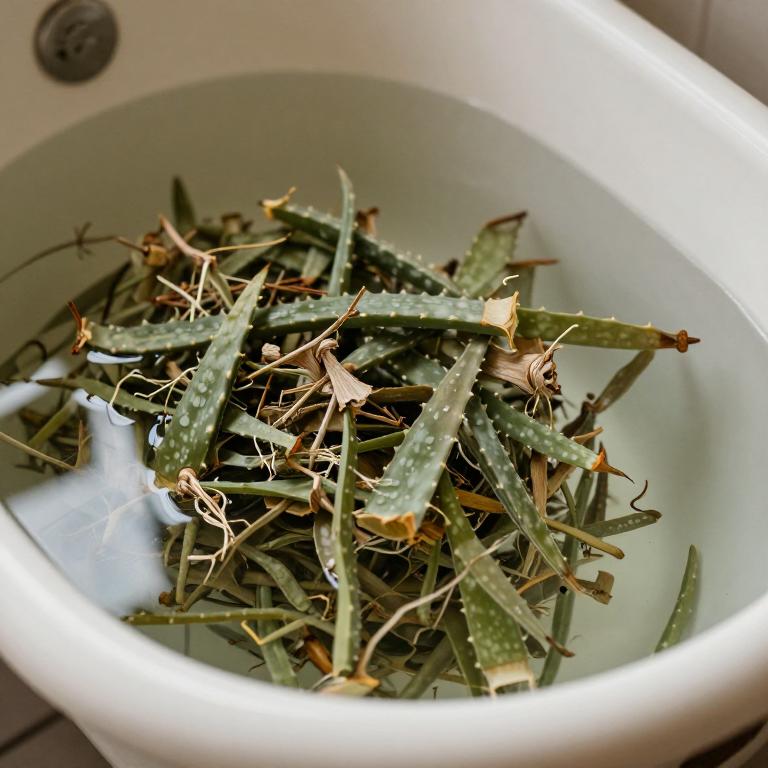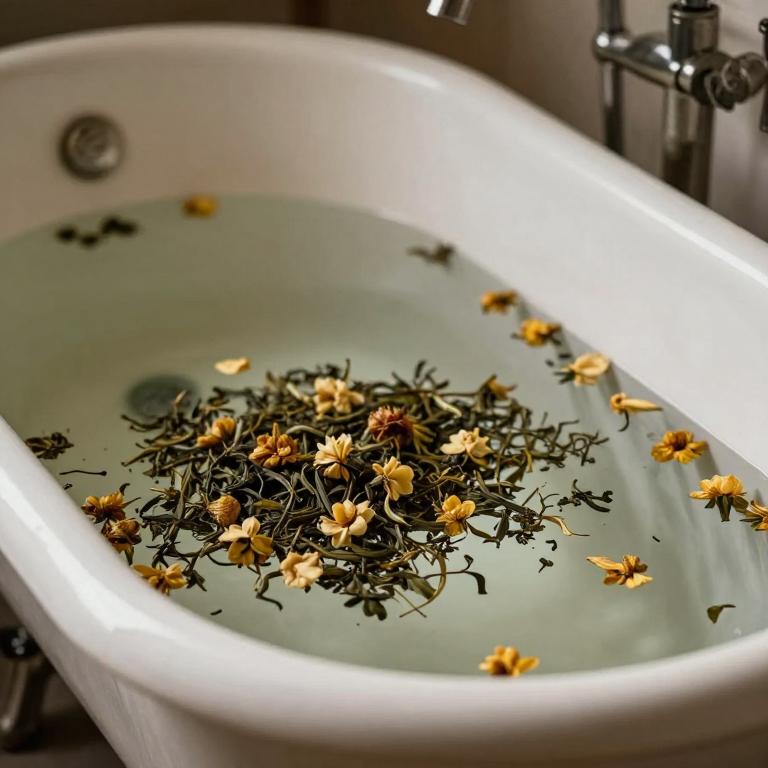10 Best Herbal Baths For Open Pores

Herbal baths for open pores involve soaking in warm water infused with natural herbs known for their skin-renewing properties.
Common herbs like chamomile, calendula, and lavender are often used due to their anti-inflammatory and soothing effects. These baths help cleanse the skin, reduce excess oil production, and gently exfoliate to minimize the appearance of open pores. The steam from the bath can also help open up the pores, allowing the skin to absorb the beneficial properties of the herbs more effectively.
Regular use of herbal baths can promote clearer, healthier skin and improve overall skin texture.
Table of Contents
- 1. Aloe vera (Aloe barbadensis)
- 2. St. john's wort (Hypericum perforatum)
- 3. Stinging nettle (Urtica dioica)
- 4. German chamomile (Chamomilla recutita)
- 5. Field horsetail (Equisetum arvense)
- 6. Salvia (Salvia officinalis)
- 7. Dog rose (Rosa canina)
- 8. English lavender (Lavandula angustifolia)
- 9. Camellia (Camellia sinensis)
- 10. Rosemary (Rosmarinus officinalis)
1. Aloe vera (Aloe barbadensis)

Aloe barbadensis, commonly known as aloe vera, is a versatile herbal remedy that can be used in baths to benefit the skin, particularly for those with open pores.
When infused into bath water, aloe vera's soothing gel helps to cleanse and hydrate the skin without causing irritation, making it ideal for sensitive or acne-prone skin. Its anti-inflammatory properties can help reduce redness and swelling around open pores, promoting a more even skin texture. The natural enzymes in aloe vera also aid in exfoliating the skin gently, which can help unclog pores and prevent future breakouts.
Regular use of aloe barbadensis in herbal baths can improve overall skin health, leaving the skin feeling refreshed and balanced.
2. St. john's wort (Hypericum perforatum)

Hypericum perforatum, commonly known as St. John's wort, has been traditionally used in herbal baths to address skin conditions, including open pores.
When infused into bath water, the plant's active compounds, such as hypericin and flavonoids, may help reduce inflammation and excess sebum production, which are common contributors to enlarged pores. The anti-inflammatory and antioxidant properties of hypericum perforatum can promote skin healing and improve overall skin texture. Regular use of St. John's wort baths may help minimize the appearance of open pores by supporting skin health and balancing oil production.
However, it is important to consult a healthcare professional before using this herb, especially for those with sensitive skin or taking medications, as it may interact with certain drugs.
3. Stinging nettle (Urtica dioica)

Urtica dioica, commonly known as stinging nettle, has been traditionally used in herbal baths to support skin health, including the care of open pores.
The plant contains compounds like histamine and formic acid, which can cause a tingling sensation when applied to the skin, potentially stimulating circulation and promoting detoxification. When used in a bath, stinging nettle can help tighten pores and reduce excess oil production, making it beneficial for those with oily or acne-prone skin. However, it is important to dilute the nettle thoroughly to avoid skin irritation, as undiluted extracts may cause a stinging or burning sensation.
Regular use of a stinging nettle bath may contribute to a clearer, more balanced complexion over time.
4. German chamomile (Chamomilla recutita)

Chamomilla recutita, commonly known as German chamomile, is a popular herbal remedy often used in bath infusions to promote skin health.
When steeped in warm water, chamomile releases its soothing compounds, such as bisabolol and chamazulene, which can help reduce inflammation and calm irritated skin. These properties make chamomile baths particularly beneficial for individuals with open pores, as they can help tighten the skin's surface and minimize the appearance of pores. The gentle, anti-inflammatory effects of chamomile can also help regulate sebum production, which is a common contributor to enlarged pores.
Regular use of chamomile herbal baths can lead to a more balanced and refined skin texture, making them a natural and effective addition to a skincare routine.
5. Field horsetail (Equisetum arvense)

Equisetum arvense, commonly known as horsetail, is a traditional herbal remedy often used in herbal baths to address open pores due to its high silica content.
The silica in horsetail helps strengthen and tighten skin tissue, which can improve the appearance of enlarged pores. When used in a bath, the plant’s astringent properties may help to constrict pores and reduce excess oil production. To prepare an herbal bath, steep dried horsetail in hot water and add it to a warm bath, allowing the skin to absorb its beneficial compounds.
This natural treatment is believed to promote skin clarity and a more refined complexion, making it a popular choice in holistic skincare routines.
6. Salvia (Salvia officinalis)

Salvia officinalis, commonly known as sage, has been traditionally used in herbal baths to promote skin health and address issues such as open pores.
When infused into bath water, sage's essential oils and antioxidants can help tighten the skin’s surface and reduce the appearance of enlarged pores. The astringent properties of sage help to cleanse the skin, remove excess oils, and balance sebum production, making it beneficial for those with oily or acne-prone skin. Regular use of sage-infused baths may improve skin texture and enhance overall skin clarity.
This natural remedy offers a gentle yet effective way to support skin health through the soothing and purifying effects of salvia officinalis.
7. Dog rose (Rosa canina)

Rosa canina, also known as rosehip, is a powerful herbal ingredient often used in baths to address skin concerns, including open pores.
The high concentration of essential fatty acids and antioxidants in rosehip oil helps to nourish and strengthen the skin's barrier, promoting a more even texture. When incorporated into a bath, rosehip can soothe inflammation and reduce redness, which may contribute to the appearance of open pores. The gentle, nourishing properties of rosa canina make it suitable for sensitive skin, offering a calming and restorative experience.
Regular use of rosa canina herbal baths may lead to improved skin elasticity and a more refined complexion over time.
8. English lavender (Lavandula angustifolia)

Lavandula angustifolia, commonly known as English lavender, is often used in herbal baths to promote skin health and relaxation.
When infused into bathwater, lavender essential oil or dried lavender flowers can help soothe the skin and reduce inflammation, which may benefit those with open pores. The calming properties of lavender can also help reduce stress, which is a known contributor to skin issues like enlarged pores. Regular use of lavender-infused baths may help tighten the skin's texture and improve overall skin tone.
However, it is important to use lavender in moderation and consult a dermatologist if you have specific skin concerns or conditions.
9. Camellia (Camellia sinensis)

Camellia sinensis, commonly known as the plant from which green tea is derived, has been increasingly used in herbal baths for its potential skin benefits, particularly for those with open pores.
The active compounds in Camellia sinensis, such as polyphenols and catechins, are believed to have anti-inflammatory and antioxidant properties that can help soothe and purify the skin. When incorporated into bath water, these compounds may help reduce excess oil production and tighten the skin's texture, potentially minimizing the appearance of open pores. Herbal baths with Camellia sinensis are often recommended as a natural alternative to chemical-based skincare products, offering a calming and detoxifying experience.
However, it is important to note that individual results may vary, and it is advisable to consult a dermatologist before incorporating such treatments into a skincare routine.
10. Rosemary (Rosmarinus officinalis)

Rosmarinus officinalis, commonly known as rosemary, is a versatile herb that has been traditionally used for its aromatic and therapeutic properties.
When incorporated into herbal baths, rosemary can help improve circulation and promote relaxation, making it a popular choice for those seeking natural skincare benefits. Its essential oils have antimicrobial and anti-inflammatory properties that may help reduce the appearance of open pores by cleansing the skin and regulating sebum production. A rosemary-infused bath can also help soothe the skin and enhance its overall texture, contributing to a more refined complexion.
Regular use of rosemary in baths may support skin health and potentially aid in managing issues related to enlarged pores.